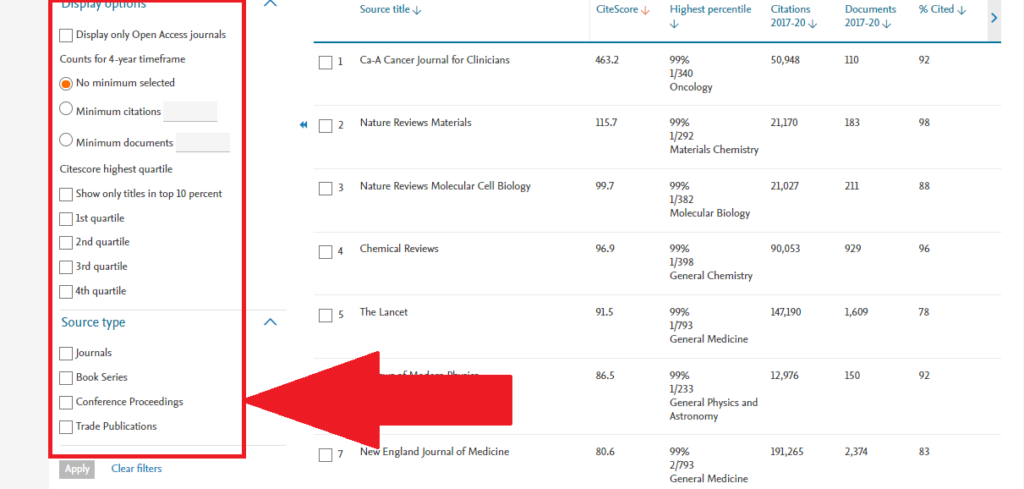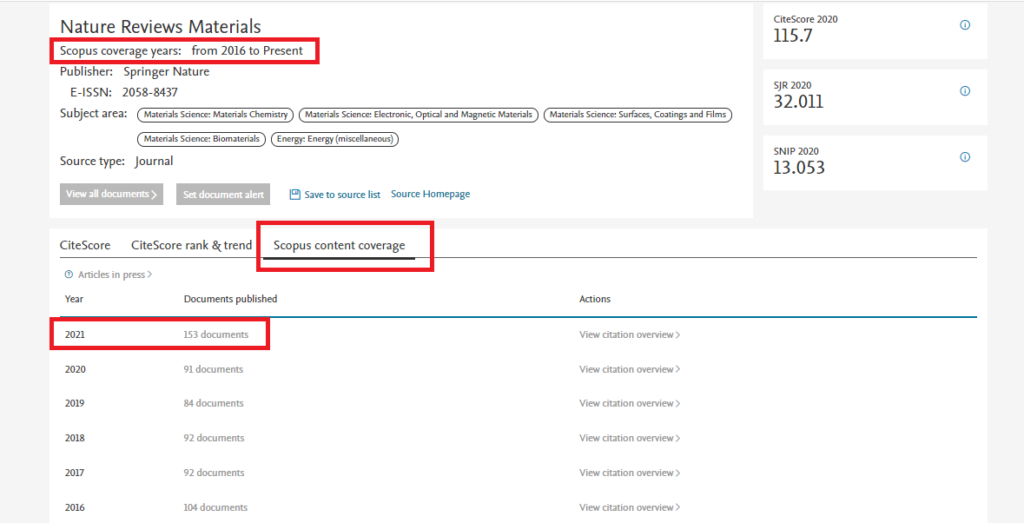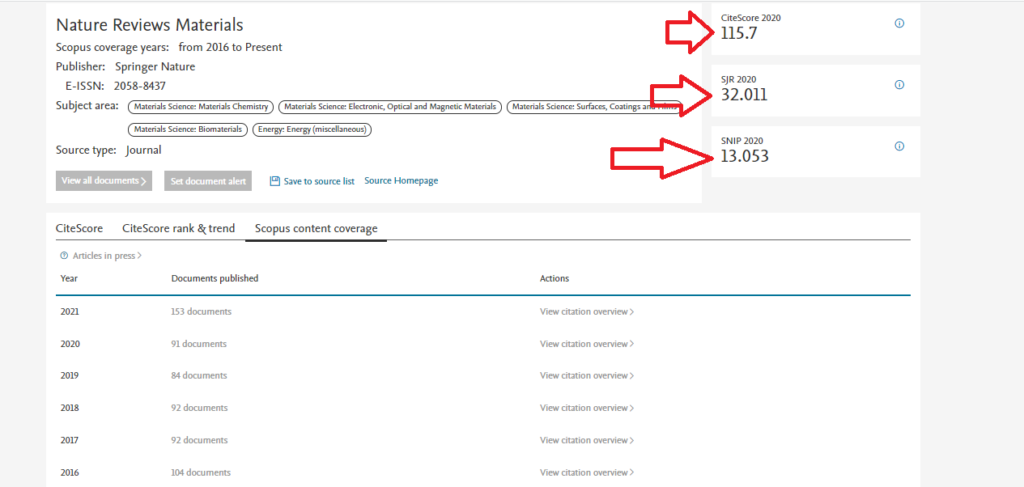International conference alerts
- Scopus Indexed Journals

Everything to Know About Scopus Indexed Journals

Every author and researcher knows about the value and prestige of Scopus Indexed Journals . Due to their amazing expertise, they are considered a benchmark for measuring conference criteria. Do you wish to publish your research paper or manuscript in the esteemed Scopus journals? Well, there are some things you should know. Today, we will learn everything about Scopus Indexed Journals.
What are Scopus Indexed Journals?
Scopus is one of the most in-depth citation databases accessible to researchers globally. It offers various academic niches, from science and technology to medicine, social sciences, and the arts and humanities. Journals included in the Scopus database, known as Scopus indexed journals, serve as essential benchmarks for assessing publication quality and impact.
Rigorous Selection Process
Being indexed in Scopus signifies a journal’s designation and authority within its academic community. This motivates researchers to target such journals to elevate the visibility, credibility, and professional growth associated with their work.
Scopus uses a thorough selection process, requiring journals to meet strict criteria for quality, peer review, and editorial integrity. Publishers submit journals for consideration, but only about 33% of the over 3,500 titles proposed annually are accepted. These criteria are necessary to ensure high academic standards and editorial quality in the database.
How do I check my Scopus Indexed journals?
Due to its worldwide popularity and reputation, many journals can lie about being Scopus Indexed Journals. But how can you determine whether they are telling the truth? Luckily, there is a way to call out the liars and find an original Scopus Indexed Journal among imposters.
While many journals claim Scopus indexing, some may not adhere to its standards. Those failing to meet the criteria are labelled “Discontinued Source” and listed on Scopus’s site, ensuring transparency. This list can help you identify suitable publication venues, highlighting Scopus’s commitment to integrity.
How do I know if a Journal is Scopus Indexed?
If you wish to verify the promises of your journals, you can do the following:
You can verify the authenticity of your journals through the Scopus source page. This user-friendly database confirms the journal’s status through a search. These are based on publishers, title, niche, and ISSN. This makes it the most current resource for verifying Scopus indexing status. You can rely on this data as it is original and helps researchers to make informed decisions.
Source Title List:
Researchers can download the regularly updated Scopus Source Title list for another verification method. While not the most efficient option, it offers an alternative worth exploring. Additionally, this list encompasses both active sources and those marked as discontinued, providing a comprehensive overview of Scopus-indexed titles.
Book Title List:
The Book Title List is a downloadable method that compiles indexed book titles in Scopus. Though the ‘Sources’ link is preferred for reliability, this list serves as an alternative confirmation method.
How do I find a list of Scopus Indexed Journals?
Publishing your research paper in a Scopus-indexed journal can yield many fruitful results and career advancement opportunities. Following these tips makes it easy to find a list of Scopus-indexed journals.
Visit the Scopus website:
You can start your search by visiting the Scopus website ( www.scopus.com ) and navigating to the Journals tab.
Search for Journals:
Once on the Journals page, you can search for specific journals by title, ISSN, or publisher.
Browse by Subject Area:
Scopus allows you to browse journals by subject area. This can help narrow down your search to journals relevant to your field of interest.
Filtering Options :
Use Scopus’s filtering options to refine your search results. You can filter by subject area, publisher, country, and more. Just type the keywords of the industry or specific topic you are looking for, and you will be able to find what you are looking for.
Check Inclusion:
After finding journals of interest, verify their inclusion in the Scopus database. Look for the “Indexed in Scopus” badge or confirmation on the journal’s website or the Scopus database.
Consult Library Resources:
Many academic libraries also provide access to lists of Scopus-indexed journals through their websites or in-person resources. You can ask your industry peers or visit them to seek the information you need.
Which is better, SCI or Scopus?
SCI (Science Citation Index) and Scopus are valuable databases for academic research, but they serve different purposes. Both platforms offer distinct strengths. SCI, part of Web of Science, emphasises high-impact journals and is widely recognized for its rigorous selection process, making it a trusted resource for citation analysis.
On the other hand, Scopus offers broader coverage across disciplines and includes more international journals, providing a comprehensive view of research output. Choosing between them depends on research needs. SCI is preferred for citation analysis and tracking prestigious journals. However, Scopus offers extensive coverage for interdisciplinary research and global perspectives. Eventually, the “better” option will depend on your specific requirements.
Benefits of Scopus?
Scopus offers many benefits that you can take advantage of. These are as follows:
Comprehensive Research Coverage:
Scopus provides access to a vast database of scholarly literature across various disciplines. It comprehensively covers research articles, conference papers, books, and patents.
Advanced Search Capabilities:
Its advanced search features enable researchers to locate relevant literature and refine search results efficiently. This is beneficial in tracking citation trends and facilitating effective literature reviews and research discovery.
Author and Institutional Insights:
Scopus offers detailed author and institutional profiles, allowing researchers to identify collaboration opportunities. Scopus can also help you track citation metrics and assess the impact of research.
Global Citation Database:
As a globally recognized citation database, Scopus enhances the visibility and recognition of researchers and institutions. It helps promote international collaboration and advance interdisciplinary research across various fields and professions.
In conclusion, authors, researchers, and academics can greatly benefit from submitting their research papers and manuscripts to Scopus-indexed journals. Follow the tricks mentioned in this blog to check the authenticity and relevance of your journals. We hope you get a golden opportunity to publish your work in a Scopus journal and gain worldwide recognition.
Related Posts

List of Scopus Indexed Journals

How to find Upcoming Scopus Indexed Conferences 2024?
Leave a reply cancel reply.
Your email address will not be published. Required fields are marked *

GoodLingua.com
Jasa Translate dan Proofreading Jurnal SCOPUS, IEEE, WoS
What, Why, How and Benefit Publish in Scopus index
August 6, 2021 August 6, 2021 | admin
1. What is Scopus
Scopus is a database of scholarly journal titles, and it is the largest abstract and citation database of peer-reviewed literature. It provides bibliometric analysis including both global and local metrics for authors, papers, journals, institutions as well as country comparisons. Scopus was launched in 2004 by Elsevier to track the world’s research output across disciplines.
It has been rated as one of the top five databases for academic research by University Libraries Worldwide with over 20 million records from more than 7800 publishers worldwide. Scopus abstracts and indexes 125000+ peer-reviewed journals from 30000+ publishing organizations around the world covering 95%+ of all scholarly content published today on a broad range of subjects including arts & humanities; biological sciences; business
2. Why publish in scopus
Publishing in Scopus is an important academic endeavor. The journal provides a platform for the world’s leading academics to publish their research, and it also offers better visibility of your work. A higher rank will be given to articles that are published in Elsevier journals, including Scopus indexed ones. Publishing in Scopus has many benefits for researchers and faculty members alike.
Publishing a paper with a top-tier journal not only improves the quality of your own work but can also raise the profile of your institution or organization by association with high-quality publications. As you may know, Google Scholar ranks all scholarly publications based on citation rates (the number of times other scholars have cited them). So if you want more people
3. How to publish in scopus
Publishing in Scopus is a way to increase your visibility and credibility. Scopus indexes over 25,000 journals from more than 5,000 publishers across the globe. Therefore, publishing in Scopus can help you get recognition from researchers all around the world for your work.
Publishing in scopus will also provide you with a “scientific h-index” which measures research productivity. The index takes into account both published papers and citations received by those papers.
Publishing in scopus will allow you to be recognized as an expert on whatever topic it is that you are researching or writing about; this can lead to new opportunities for collaboration with others who share similar interests as well as increased funding opportunities through grants and fellowships
4. Benefits of publishing in Scopus
Publishing in Scopus can help you reach a wide audience and receive recognition for your research. Publishing in the open access journal will also help you to secure funding from institutions such as the National Institutes of Health (NIH).
Publishing in Scopus is free, but there are some costs associated with publishing an article. The publication fee varies depending on the type of article that is being published, so make sure to review these rates before submitting your manuscript. For example, if you’re publishing a regular research article, then it’s $1,000 per article with discounts available at 10 or more articles submitted simultaneously. If you’re publishing a book chapter or commentary-type piece, then it’s $2,500 per article. Reviewers
Publishing in Scopus has many benefits. It allows researchers to share their research with a global audience and helps them maintain an international reputation. Publishing in Scopus provides access to the latest content from more than 25,000 peer-reviewed journals and is read by over 10 million people each month. To publish your article, you will need to create an account on Scopus Author Services website or use your existing username if you have one already. Once logged into the site, click “Publish” on the top right hand corner of the screen and fill out all of the required fields for publication such as title, abstract text, keywords etc. After submitting this information successfully your article will be published within 3 business days so it can be viewed by others!
5. Important points about publishing in Scopus
As a student, it is important for you to publish your research in journals and conferences. This will help build your credibility as an academician which may lead to better opportunities later on. However, publishing in Scopus helps with this process because they have indexed over 18000 of the world’s leading scholarly journals and databases from all subject areas and disciplines.
In addition, their indexing quality assurance team ensures that articles are selected based on strict criteria – these include how often an article has been cited or downloaded by other scholars (impact factor), the date of publication (relevance), journal prestige/ranking (quality) etc.
Publishing in Scopus also provides many benefits like high visibility for authors who can be found through Google Scholar; inclusion
6. Tips for Publishing in Scopuis - A Step by Step Guide for Successful Publication
The first step is to figure out which journal would be a good fit for your work. To do this, search the database of Scopus’ sister site SciVerse ScienceDirect and find journals using keywords related to your topic or discipline. Once you’ve found some potential matches that seem like they might accept your work, go ahead and visit their website
Leave a Comment Cancel reply
Save my name, email, and website in this browser for the next time I comment.
Bekerja sama dengan GoodLingua
GoodLingua bekerja sama dengan instansi, editor jurnal, panitia konferensi, maupun perorangan dalam memperbaiki paper agar dapat diterbitkan pada jurnal terindeks Scopus atau dipresentasikan pada konferensi terindeks scopus
© 2020 - PT. Internasional Translasi Edukasi (GoodLingua.com)
Jasa Proofreading Scopus - Jasa Translate Jurnal - Penerjemah Jurnal
Research guidance, Research Journals, Top Universities
How to publish a research paper in Scopus journals?

If you are looking for assistance in publishing a research paper in Scopus-indexed journals , then you are at the right place. In this blog post, we will guide you on how to publish a research paper in Scopus indexed journal easily with/ or without publication fees.
I am Dr. Sunny Sharma and I have published various research papers in Scopus-indexed journals without publication fees . This blog post will help you in publishing research papers in Scopus journals easily.
Researchers can also publish in Scopus journals in fast-track mode. There are various fast-publishing research journals that publish papers on a monthly basis.
First of all, I will guide how to write a good research paper . Then I will provide you with important publication tips along with a list of top (easily published) Scopus-indexed journals.
The outcomes of this blog post are:
- What are Scopus journals?
- How to find free Scopus-indexed journals?
- How to write a research paper?
- How to send a research paper to a research journal?
- How do publish a research paper in Scopus indexed journal for free?
- How to check Scopus journals?
Page Contents
Scopus indexed journals
Scopus is an abstract and citation database of peer-reviewed literature: scientific journals, books, and conference proceedings. Scopus covers nearly 36,377 titles from various publishers.
Download the Scopus-indexed journals list 2023
Steps in publishing a research paper in Scopus indexed journal
- Choosing a research topic/ selecting a research problem.
- Identifying the best non-paid Journal that is Scopus Indexed.
- Writing Your Research Paper as per the Guidelines of the Journal.
- Submitting Your Paper.
- Waiting for the reviewers’ response.
- Publication of the research paper.
1) Choosing a research topic/ selecting a research problem
Selecting a research problem/ research topic is the first step in publishing a research paper. Researchers can target a few relevant journals for the literature review. The literature review helps researchers to identify a research problem.
A research problem is a specific issue, difficulty, contradiction, or gap in your area of research that you will aim to address through your research.
2) Identifying the best Journal that is Scopus Indexed
The next step is to identify the best Scopus-indexed journal for publication. This is one of the most important steps most researchers skip. Writing a research paper according to the target journal guideline increases paper acceptance chances.
How to select the best Scopus-indexed journal for publication?
There are various ways to select or choose free publishing Scopus-indexed journals. One can choose Scopus journals through visit the official website of Scopus and then finding journals based on the subject area selection from the left side.
Moreover, researchers can also use the PhDTalks journal finder tool to find Scopus journals instantly online. This online journal finder tool can also be used to find Web of Science- SCI journals , Open Access journals , and UGC CARE-approved journals .
Free (Non-Paid) Scopus Journals – 2023

After selecting a few research journals, researchers can read already published research papers in these journals. This will help researchers while writing their own manuscripts.
Moreover, researchers can download the targeted journals’ format and have to follow the guidelines of the journals.
3) Writing Your Research Paper as per the Guidelines of the Journal
Writing a research paper is an art. Researchers have to follow some basic points while writing. It is very easy to publish research papers in Scopus journals if you implement the basic points. The more clearly you write your paper, the more chances are for publication in Scopus-indexed journals.
Download Research Paper Format IEEE, Elsevier, Springer, all
Format of a research paper:
- Introduction
- Previous Research
- Problem Formulation
- Model or Methods and Results
We have already written the process of writing a research paper.
The link to the post is : How to write and publish a research paper for journal publication?
4) Submitting the research paper to the journal
The next step after the proofreading is the submission of the research paper to the Scopus-indexed journal. For this, perform the following steps:
- Visit the official website of the journal.
- Create an account and log in to the journal.
- Upload the research paper along with the other files.
- Complete all the required steps.
- Finally, the paper will be submitted to the journal and you will get a confirmation message in your email. Researchers can also track the status of their research papers.
The next step is waiting for the reviewers’ response.
5) Waiting for the reviewers’ response
After you have submitted your research paper to the editorial team. The research paper is further sent to two or more reviewers. The reviewers review the papers. Generally, the reviewers have given a time of around two weeks. The time period also varies from journal to journal.
More often, reviewers demand the author of the research paper to make changes and resubmit the manuscript to them.
6) Publication of research paper
If the reviewers are satisfied with the modifications they recommended, you will accept the acceptance letter from the journal and your research paper will publish in the Scopus-indexed journal in a short time.
Frequently asked questions
No doubt, It is not so easy to publish in non-predatory Scopus-indexed journals. However, focused research and journal guidelines make it possible to publish in Scopus journals easily and fast.
Researchers don’t require to pay APC to publish in Scopus. There are thousands of free Scopus indexed journals that publish research without publication fees. High-quality journals expect researchers to submit quality research.
Paper publication in Scopus-indexed journals takes time from 3 to 10 months. It varies from journal to journal. You can get the publication time details from the journal’s website. There are also fast publishing Scopus indexed journals: https://journalsearches.com/fast-journals.php

Share this:
Leave a comment cancel reply.
Save my name, email, and website in this browser for the next time I comment.
Notify me of follow-up comments by email.
Notify me of new posts by email.
- Scopus: Access and use Support Center
To post social content, you must have a display name. The page will refresh upon submission. Any pending input will be lost.
- Support Center
How do I search in Scopus?
You can search in Scopus by document, author, or by affiliation:
Scopus allows you to search for publications based on search terms relating to specific parts of a document (e.g., title, author, keywords, ISSN).
To search for a document:
- Go to the Scopus homepage . The default page is the Document search.
- Select the fields to search within from the Search within drop-down.
- Enter your terms in the Search documents field.
Note: To add search terms, select 'Add search field' for an additional search term line.
- Select 'Search' . For information about how to work with document search results, see document search results .
Document search tips:
Use boolean operators to combine different search queries and proximity operators to find words near/within a specified distance of each other.
Boolean operators - OR, AND, AND NOT
Rules for using boolean operators:.
- AND NOT e.g., KEY(mouse AND NOT cat OR dog) is interpreted as KEY((mouse) AND NOT (cat OR dog))
- AND NOT should always be used at the end of the query.
- To search for a specific phrase, enclose the terms in double quotes (" ") or for an exact match use braces ({}).
Proximity operators - W/ n , PRE/ n
You can choose between two Proximity operators to find words within a certain distance from each other: Pre/ n specifies a word order whereas W/ n does not.
Tips for proximity operators:
There are two ways of searching for phrases, an exact search and a loose/approximate phrase, depending on how exact a match you want to find.
Loose/approximate phrases
Double quotation marks are important when searching for a loose/approximate phrase.
- Loose phrase: TITLE-ABS-KEY( "heart attack") searches for documents where heart attack appear together in the title, abstract, or keywords.
- Not a loose phrase: TITLE-ABS-KEY( heart attack) searches for documents where heart and attack appear together or separately in the title, abstract, or keywords.
- Dots and hyphens are treated as intentional. When a dot/hyphen is used, it is ignored and the search terms are treated as a loose phrase
- heart-attack or heart.attack is searched as "heart attack"
- Wildcards work: "criminal* liab*" finds criminally liable and criminal liability .
- Plurals and spelling variants are included: heart attack includes heart attacks , anesthesia includes anaesthesia .
- Double quotation marks can be used to search specifically for stop words and special characters: "crocodiles with alligators" will return results such as: Crocodiles with alligators are among the largest reptiles .
- title-abs-key (*/art) is searched as title-abs-key(art)
- abs(iwv-*) is searched as abs(iwv)
Exact phrase
To find documents that contain an exact phrase, enclose the phrase in braces: {oyster toadfish} .
RESULT: This includes any stop words , spaces, and punctuation which you included in the braces. For example:
- {heart-attack} and {heart attack} will return different results because the dash is included.
- Wildcards are searched as actual characters, e.g., {health care?} returns results such as: Who pays for health care?
You can search for accented characters either with or without the accent. The results contain both variants.
Example: España and Espana are both found whether you entered espana or españa .
This also applies to special characters.
Letters from the Greek alphabet and their spelled-out equivalents – alpha; α
Special characters that have common equivalents like π r⊃2; - pr2
Special characters with no common equivalents, punctuation, and spacing are ignored.
To search specifically for a special character or a punctuation mark, enclose it in braces {π}.
Using the singular form of a word in your search retrieves the singular, plural, and possessive forms of most words.
Scopus applies word stemming to fields containing text (not to names, affiliations, dates, or numbers). Word stemming ensures that different occurrences of a word are found.
Example : criterion finds criteria and criterion
Use these filters to reduce your search results:
Scopus coverage focuses on primary document types from serial publications. Primary means that the author is identical to the researcher in charge of the presented findings. Scopus does not include secondary document types, where the author is not identical to the person behind the presented research, such as obituaries and book reviews.
Document types covered in Scopus
- Article or Review
- Book or Book Chapter
- Book Chapter
- Article or Conference Paper
- Conference Paper
- Conference Review
- Short Survey
- Business Article or Press
Document types not covered in Scopus
- Book reviews
- Conference meeting
For more in-depth information on document types, please see Section 3 of the Scopus Content Coverage Guide .
The author search helps you find documents written by a specific person in Scopus , even if the author is listed inconsistently. For example, an author may be cited as Smith, J in one document, but as Smith, John in another. The Scopus Author Identifier allows you to identify between different authors in author search results.
You can also search using an Open Researcher and Contributor ID (ORCID). For more information, see How do I search for authors using ORCID?
- From the Scopus homepage , select the 'Authors' tab.
- From the 'Search using' dropdown, select 'Author name' to search by name or select 'ORCID' .
- Enter the last name of the author in the 'Enter last name' field. Alternatively, enter the ORCID number. The last name of the author is required. You can also enter a first name or initials, and an affilation name to further narrow your results.
- Select 'Search' .
Author search tips
Author Search results include any available author name variations that match your search criteria. For example, searching for Smith, J will also produce Smith, John in the results.
Here is how to limit your search results (e.g., for Smith, J.):
Unsure about spelling the author’s name? Use Wildcards to replace letters with unknowns:
The hyphen is treated as punctuation and therefore ignored if it is not in an exact phrase. Wildcards must be used with words because they cannot be standalone. When an hyphen is placed between a wildcard and a word, the wildcard will be dropped.
- Author last name: Smith-*
- Author last name: Jones and Affiliation: *-smithsonian
It is also possible to search an Author in Advanced Search with their author ID. For example: AU-ID(000000000)
Multiple author IDs can be searched as well: For example: AU-ID(000000000) OR AU-ID(111111111) OR AU-ID(222222222)
Any author search field Codes can be used with OR between them to search multiple authors.
An affiliation search returns a list of institutions with links to documents and a summary of the institution's research areas, collaborations, and publications.
To search for documents and authors within those affiliations:
- From the Scopus homepage , select the 'Affiliations' tab.
- Enter the name of an institution in the 'Search affiliations' field.
- Select the arrow to search.
Affiliation search tips
- AND NOT e.g., ‘KEY(mouse AND NOT cat OR dog)’ is interpreted as ‘KEY((mouse) AND NOT (cat OR dog))’
- To search for a specific phrase, enclose the terms in double quotes (" ") or, for an exact match, brackets ({}).
Use these characters (wildcards) to find variations of a word:
Note: The hyphen is treated as punctuation and therefore ignored if it is not in an exact phrase. Wildcards must be used with words because they cannot be standalone. When an hyphen is placed between a wildcard and a word, the wildcard will be dropped.
- Affiliation name: micro-*
For example, you can enter Técnicas or Tecnicas for your search. Searching for Tecnicas returns results for e as well as é.
Here are some different field codes you could use:
You can combine two or more searches with the operators OR , AND , and AND NOT using Combine queries.
- From the Scopus homepage , select the 'Search history' tab.
- Choose two or more searches and select 'Combine queries' .
- From the Combine queries page, select the desired operator from the operator dropdown for each query combination. Note: Select an operator from the Change all operators dropdown to syncronize all operators.
- Select 'Show results' to view the results of the combined query.
Was this answer helpful?
Thank you for your feedback, it will help us serve you better. If you require assistance, please scroll down and use one of the contact options to get in touch.
Help us to help you:
Thank you for your feedback!
- Why was this answer not helpful?
- It was hard to understand / follow.
- It did not answer my question.
- The solution did not work.
- There was a mistake in the answer.
- Feel free to leave any comments below: Please enter your feedback to submit this form
Related Articles:
- How to conduct a basic search tutorial
- How can I best use the Advanced search?
- How do I work with document search results?
- Scopus tutorials
- What is the Scopus Author Identifier?
For further assistance:
- +91 8287801801
- [email protected]
Research Paper | Book Publication | Collaborations | Patent

- Research Paper
- Book Publication
- Collaboration
- SCIE, SSCI, ESCI, and AHCI

Scopus Indexed Journals A Trusted Source for Quality Research Publications
In the ever-evolving world of academia, research publications are pivotal in advancing knowledge and driving scientific progress.
Get A Free Quotes
Introduction.
As researchers seek recognition and validation for their work, the credibility and impact of their chosen journals become paramount. Among the numerous databases that index scholarly articles, Scopus stands out as a widely recognised and respected platform that has gained immense popularity among researchers worldwide. This article aims to shed light on Scopus-indexed journals, highlighting their significance, benefits, and why they are regarded as a trusted source for quality research publications.

What is Scopus?
Scopus is a comprehensive, multidisciplinary abstract and citation database managed by Elsevier. Launched in 2004, it covers many subjects , including science, technology, medicine, social sciences, and humanities. Scopus boasts many scholarly articles, conference papers, and patents from thousands of reputable journals and conference proceedings. The database is continuously updated, ensuring researchers can access the latest and most relevant research in their respective fields.
Selection Process for Scopus Indexed Journals
Getting a journal indexed in Scopus is rigorous and involves stringent evaluation criteria. When a journal is submitted for consideration, Scopus employs a team of expert content analysts and subject specialists to assess its quality and relevance. Some key factors considered during the evaluation include:

- Peer Review: Scopus requires that journals maintain a robust peer-review process to ensure the validity and accuracy of the published research.
- Editorial Standards: Journals must adhere to high editorial standards, promoting ethical publishing practices and author guidelines.
- Citation Analysis: The number of citations received by articles published in the journal is a significant factor. Journals with a higher citation count demonstrate greater impact and influence within the scholarly community.
- Publication Frequency: Regular and timely publication of issues is crucial to maintain the journal's credibility and relevance.
- International Diversity: Scopus aims to encompass journals from various regions, promoting global representation and diverse perspectives in research.
In conclusion, Scopus-indexed journals have earned their reputation as a trusted source for quality research publications. The rigorous selection process, extensive coverage of academic disciplines, and the database’s global reach contribute to its widespread popularity among researchers. Publishing in a Scopus-indexed journal not only enhances a researcher’s visibility and impact but also adds a sense of credibility and validation to their work. As the academic landscape continues to evolve, Scopus remains a valuable tool for researchers seeking to contribute meaningfully to their fields and make a lasting impact on the scientific community.

Benefits of Fast Publishing in Scopus Indexed Journals
- Visibility and Reach: Scopus-indexed journals enjoy widespread visibility, as millions of researchers, academics, and institutions worldwide access the database. This high level of exposure can significantly increase the chances of a researcher's work being discovered and cited by others.
- Impact and Citation Metrics: Scopus provides a range of citation metrics for individual articles and entire journals. Researchers can track the impact of their work, monitor citation trends, and benchmark their performance against other publications in the same field.
- Credibility and Recognition: Publishing in a Scopus-indexed journal adds a layer of credibility to the research, as it indicates that the journal has met stringent quality standards. This recognition can boost the author's reputation and academic profile.
- Collaboration Opportunities: Scopus facilitates networking and collaboration among researchers in similar areas. Researchers can identify potential collaborators, connect with field experts, and foster meaningful partnerships.
- Funding and Career Advancement: Many funding agencies and institutions consider publications in Scopus-indexed journals as crucial when evaluating grant applications and career advancement opportunities.
Latest Blogs

Discover Top Scopus Indexed Medical Journals…

The Significance of Scopus Indexed Journals…

Aimlay is a top-notch Educational and Writing service platform for the last 13 years. Our team of experienced professionals is dedicated to providing you with the highest quality services to ensure that your work is published in reputable national and international indexed journals, and other scholarly works.
Quick links, useful links, blog categories.
- +91 8287 801 801
- 412, Fourth Floor, D Mall, Bhagwan Mahavir Marg, Swarn Jayanti Park, Sector 10, Rohini, Delhi, 110085
Copyright © 2023 AIMLAY
Javascript not detected. Javascript required for this site to function. Please enable it in your browser settings and refresh this page.

Steps to submit Scopus indexed journals 2023
The hallmark of success for every academic who is involved in some form of research and development activities or scientific exploratory venture is to have their research paper or article published in a leading Scopus indexed journal within their field or area of specialization. This is owing to the fact that Scopus indexed journals with publications are recognized as those journals that can be trusted by the masses for the information and insights shared therein. Scopus approved journals enjoy perhaps the highest subscriber bases of all journals in the globe. For a journal or a publication to be listed within the Scopus index, it needs to exhibit proof of its authenticity, quality, and trustworthiness. Journals ensure this by publishing-
top quality research studies and reports,
thoroughly verified and fact-checked data, and
research articles and papers only from authenticated and credible researchers.
This is why most Scopus indexed journals have rigorous reviewing processes and Scopus paper submission guidelines in place to sift through sub-par journals and publications and put out only the best of the best research articles.
If you are a researcher or scientist who is keen on making your work known to the masses so that you may be able to heighten your standing within the academic community and gain a reputation as an established and credible researcher or academic who is known for his/her pioneering research work, then the best way to go about doing so is to get your research paper published in a leading Scopus indexed journal within your domain or specific stream of specialization. Doing so however is not as easy as it seems or someone who has had their research already published in a top Scopus indexed journal might make it out to be. Paying attention to the guidelines, thinking about the formatting requirements and writing your paper accordingly, while also keeping track of deadlines, can be both grueling and painstaking. Being prepared and acquiring a fair idea of how things work albeit, should help you out in getting your paper published without much ado, but also in quick time, without having to wade through any roadblocks in between.
Detailed below are all the steps involved in successfully getting a research paper or article published in a leading Scopus indexed journal or publication within one’s field or area of specialization.
- The problem that most researchers and academics who wish to get their research work published in top Scopus indexed journals face is that they find it hard to discover these journals in the first place.
- This is primarily because of the lack of awareness amongst members or the academic community in general, about whom to approach to look for a Scopus indexed journal or where to look.
- Thankfully, with the advancements of technology and the internet, it has become easier than ever for researchers and academics to look for leading Scopus indexed journals within their respective field/domains of study.
- ISSN number of the journal,
- precise title of the journal,
- domain of specialization,
- publisher’s name,
one can easily conduct a basic search on the Scopus website to look for either a specific journal or a group of journals (within a particular domain or area of specialization).
- Scopus has a pretty advanced search facility in place to make it easier for researchers to discover indexed journals and publications within their respective domains and specializations with absolute ease.
- For those researchers who do not know of any specific Scopus indexed journal or publication that they would like to have their research published in, this is the best way to go about compiling a list of all leading journals within their domain.
- This particular step is one of the most crucial of all steps when it comes to getting one’s work published in a world-renowned Scopus indexed journal .
- This is not only important to getting one’s work published within a world-renowned Scopus indexed journal, but also for the paper to have maximum impact within the global academic community.
- Very often academics who tend to read a lot of journals and publications often either have a clear idea of a specific Scopus indexed journal that they want to have their work published in or the sort of publication that they would prefer.
- Albeit, this is not the case with all researchers and academics, and such professionals often have a tough time determining which journal is the most suitable for their particular brand of research and exploration.
- reach (subscriber base) of the journal,
- reputation of the journal within the global academic community,
- lucrative opportunities that will be made available as a result of getting your work published in the journal,
- sort of research articles and papers that they journal is known and recognized for,
- fact that the journal is either an open-access or a closed-access journal.
- Thinking about all these things carefully should help any professional single out the best publication for their research work, that is most likely to get their research work the most attention.

- In order to secure quality, all respectable Scopus indexed journals have formatting regulations in place that academics wishing to have their work published in, have to adhere to.
- These guidelines not only assist in ensuring uniformity within the publication, but also the quality and tone of the writing of the article as well as the data offered therein.
- In order for a researcher to breeze past the reviewing process of the chosen publication, it is crucial for them to gain a thorough understanding of all the formatting guidelines put forth by the publication.
- Aside from helping maintain quality standards, this will also help in getting your research paper reviewed and approved for publication by the reviewing committee of the journal, as quickly as possible.
- When it comes to acquiring an understanding of the formatting regulations put forth by the chosen Scopus indexed journal, it is essential to pay attention to the detail.
- This is because the intricacies of these rules often lie in the minutest of details and are easy to forget or miss out on entirely if not thought about carefully.
- Aside from adhering to all the guidelines and formatting rules put forth by the chosen Scopus indexed journal, it is vital for a researcher to be aware of all the deadlines for submission, review, and final submission.
- Being aware of these guidelines, working according to these timelines and abiding by them, is guaranteed to help speed up the entire Scopus journal publication process for any researcher and academic.
- Not only does submitting before deadlines assist in getting a research paper published as quickly as possible, but it also helps in elevating one’s respectability amongst the publication committee.
- Paying heed to all deadlines and formatting guidelines helps paint an image of one’s thorough professionalism and character, which is highly important when it comes to forming strong bonds and relationships within the publishing community.
- the relevance of the research work carried out,
- the pertinence of the outcomes of the research work to journal’s own niche and brand,
- the authenticity of the data accrued and the insights specified,
- the adherence to the formatting guidelines put forth by the journal/publication, as well as,
- the quality and tone of the article.
- It is highly recommended that all researchers and academics try and find out about the reviewing committee’s requirements before they proceed to submit their papers, so that their papers may be reviewed and published quicker.
- The key to getting your research paper or article published as quickly as possible by a Scopus indexed journal is to make the task of the reviewing committee that is going to review and vet your paper, as easily as possible.
- This can only be done by strict adherence to all the rules and regulations put forth by the journal as well as the reviewing committee of the chosen journal.
- checking out the website of the journal (many clearly state their requirements),
- getting in touch with the reviewing committee of the journal (either through email, phone call, the journal’s website, or social media), and
- interacting with those who have had their work published by the same journals and those who are likely to be familiar with the reviewing process of your chosen journal.
- Doing some digging into the specific requirements of your chosen journal is guaranteed to stand you in good stead when it comes to breezing through the reviewing process.
Following all the guidelines listed above to a tee, is sure to have any research, academic, scientist, scholar and student, have their hard work pay off by getting the world to pay attention to their groundbreaking research outcomes and findings, via a paper or article publication by a world-renowned Scopus indexed journal. Not only does adherence to the above-mentioned steps facilitate successful publication with a leading Scopus indexed journal, but also fast Scopus publication which is crucial for one’s research to have maximum impact.

- Publications
Selection of the journal
1. Use the official Source List compiled by Scopus: Visit the Scopus web-site ( https://www.scopus.com/sources ) and use the search tools to select a journal that matches your research subject. Check whether the journal accepts articles free-of-charge or with a low publication fee.
2. Check Open Access Journal Lists: Many open access journals provide free publishing. However, it is worth considering that some of them may charge small fees to cover publishing costs.
Requirements for the article and preparation for submission
1. Carefully read the instructions for the authors: Make sure that your article meets the requirements of the journal in structure, formatting and other parameters.
2. Prepare an abstract and keywords: Make a short and informative abstract that reflects the essence of your research. Choose keywords that will help your article to be noticed and found by search engines.
3. Check the text for plagiarism: The journals indexed in the Scopus database strictly monitor the uniqueness of the articles received. Use specialized programs to check your text for plagiarism to avoid rejection.
4. Use the citation responsibly: Cite only sources that are relevant to your research. Avoid excessive citation.
Article submission and reviewing process
1. Register on the website of the journal and send the article: Follow the instructions of the journal for sending articles and upload all the necessary files.
2. Be patient and ready for revisions: The review process can take from a few weeks to a few months. Be aware of the fact that reviewers may ask you to make changes in the article.
3. Study carefully the comments of reviewers: Take into account the comments and suggestions of reviewers and make appropriate changes in your article.
4. Submit the edited article: After making changes, submit the article for reconsideration.
Successful publication and next steps
1. Tell the public about your article: Having successfully publishing an article in the journal indexed in Scopus, share a link to your research on social networks, scientific forums and with colleagues to draw attention to it.
2. Track your article’s citations: Use Scopus services and other scientific databases to track how your article is cited by other researchers.
3. Continue to develop in the scientific field: Participate in scientific conferences, follow new publications in your field and strive to further develop your scientific achievements.
This can be done with the help of professionals
For many researchers, publication in Scopus can be a complex and time-consuming process. In this case, seeking help from professional companies such as E-SCIENCE SPACE can greatly facilitate and accelerate this process. Especially for this, we created an all-inclusive service “Publication in Scopus” – https://e-science.space/en/services/publishing-in-the-scopus-journals/
Conclusions:
It is possible to publish an article in a journal indexed in Scopus free-of-charge if you select the appropriate journal with open access or low publication fees. It is important to carefully prepare the article, observing the requirements of the journal, and show patience during the reviewing process. Consider all the tips and recommendations presented in this article, and you have every chance to publish your work successfully in Scopus without significant financial costs.
The free publication in Scopus may require additional efforts, but this is an important step to expand the audience for your research papers and uphold your reputation in the academia. In the end, your article will attract more attention, facilitate cooperation with colleagues and possibly open up new opportunities for your scientific career


Making your Research easy

How to search Scopus indexed journals
You might be in the process of publishing your research paper in a Scopus Indexed journal. That’s why you are reading this article. Let me tell you are in the right place to learn How to search Scopus indexed journals .
No matter who you are you need to publish your paper papers regularly if you want to succeed in your research and academic career.
Scopus is one of the most followed and reputed journal Indexing agencies globally. Scopus database is followed by almost every University in the world. If you are Ph.D., Master/ bachelor student then you need to publish your paper in a Scopus indexed journal as per the university and academic degree requirement.
Many researchers face difficulties to search for a good Scopus indexed journal to publish their papers. In this article, we will guide you through the step-by-step process to search Scopus indexed journals . We will also discuss how to get the Scopus indexed journals list.
Is it easy to publish in Scopus indexed journals?
Journal publication is a complex procedure in every researcher’s life. But, if you follow the right procedure to publish your paper then it becomes very easy to publish in Scopus Indexed journals.
All you need to know is the right steps and procedure to write a research paper and publish it in a good Scopus Indexed journal.
Why Scopus Indexed journals are so important?
As we have discussed, every researcher or student needs to publish a paper in Scopus indexed journal to fulfill their degree requirement.
But Scopus is such a prestigious journal database and indexing platform. Scopus only selects journals after checking several parameters of a journal.
So, only the best quality journals get a chance for the indexing status of the Scopus. This means the journal which is indexed in the Scopus database are considered to be high in standard and most researchers and scientist refer to those journals for their future work or research.
So getting a research paper published in a Scopus indexed journal brings extreme joy and prestige for any author or researcher.
Always search any Scopus indexed journals on the official website of Scopus.
Go to https://www.scopus.com/sources
You can search the journal by these parameters
- Subject area
If you know the ISSN of the journal, then choose the Option “ISSN” from the option and write the ISSN on the right-hand side of the search bar and press the ” Find Source” button
Similarly, if you know the Title of the journal then you can choose the “ Title” and write the title of the journal on the right-hand side and press the ” Find Source” button
Must read: How to publish in ABDC journal?
If you do not know the ISSN and Title of the journal then you can search journals by selecting “ Subject area” from the left option and selecting the subjects to find the journals indexed in this category.
Using filter for further search
On the left-hand side, you see the filters to search your journal more accurately. This helps in if you are searching with the option of “Subject area”

You can search only open access journals by selecting Display only Open Access journals from the Display option
What is Scopus content coverage?
Apart from indexing, Scopus also displays the Scopus coverage years and the number of papers indexed in a particular year. It’s also important to check for a particular journal.

CiteScore measures average citations received per document published in the serial. CiteScore 2020 counts the citations received in 2017-2020 to articles, reviews, conference papers, book chapters, and data papers published in 2017-2020, and divides this by the number of publications published in 2017-2020.
The CiteScore calculation (numerator and denominator) consists of the following publication types: articles, reviews, conference papers, data papers and book chapters.
The 4-year CiteScore time window provides a robust assessment of citations to papers after their publication. A 4-year publication window is a good fit for all subject areas and is long enough to capture the citation peak of the majority of disciplines.

SCImago Journal Rank measures weighted citations received by the serial. Citation weighting depends on the subject field and prestige (SJR) of the citing serial.
Source Normalized Impact per Paper: this measures actual citations received relative to citations expected for the serial’s subject field.
Scopus removed journals list
In our previous articles, we have discussed the removed journals. Scopus has been updating its database from time to time. According to Scopus, it is updating a list of journals 3 times a year but in recent months Scopus starts updating its database almost every month.
The Scopus is constantly adding and removing journals to make the database more accurate and provide information only of good journals.
Scopus discontinued list February 2021
Also read: Scopus discontinued list March 2021
Scopus discontinued list April 2021
Scopus discontinued list 2020 December
How to publish conference proceedings in Scopus?
Apart from the journals , you can search Conference proceedings in Scopus . If you are a Conference organizer then you need to submit your conference proceedings to Scopus to get an indexing status in Scopus.
Must read: How to check Scopus indexed journals?
Conference proceedings having high-quality papers after the peer review proces s can be indexed in Scopus.
You can find book series and trade publications in the Scopus database apart from Journals and conference proceedings.
Must read: 5 Best tips for choosing the right Journal
Scopus indexed journals list.
Here you can get Scopus indexed journals list. Log in to the Scopus account and download the Scopus indexed journals list .
Final words
Scopus is one of the most advanced and reputed Indexing for Journals. It helps the researchers to find a good quality journal and displays several parameters and metrics to check the quality of the journals. If you are a researcher you must choose a journal from the Scopus Indexed journals to get your paper published. this all about How to search Scopus indexed journals .
J oin Our Telegram channel for the latest updates Click here https://t.me/whatisresearch

Related Posts

New Scopus indexed journals 2022 August [188 new journals added]

IEEE Global Communications Conference 2021

ASME Membership, all things you need to know about.
Leave a reply cancel reply.
Your email address will not be published. Required fields are marked *

IMAGES
VIDEO
COMMENTS
This video shows how to search appropriate Scopus-indexed journals for publication. Journal finder and Journal suggester sites are discussed.**SUBSCRIBE, cli...
Being indexed in Scopus signifies a journal's designation and authority within its academic community. This motivates researchers to target such journals to elevate the visibility, credibility, and professional growth associated with their work. Scopus uses a thorough selection process, requiring journals to meet strict criteria for quality ...
If you publish an article in a journal in the Scopus collection, it will automatically be included in Scopus under the title and ISSN of the journal. Once Scopus receives an article, it is usually indexed within four days. If you have published an article in a journal which is not covered by Scopus, you can suggest the journal to be included ...
Publishing in a Scopus indexed journal is a great way to showcase your research and make it visible to a global audience. ... Choosing the best Scopus indexed journal for your research paper can ...
Prior to publish a research paper in a Scopus indexed journal, academicians and researchers must have a deep understanding of Scopus. As Elsevier's largest abstract and citation database, Scopus offers a peer-reviewed list of journals and book series, conference proceedings, and trade journals. It was launched in 2004.
As the largest indexer of global research content, Scopus includes titles from more than 7,000 publishers worldwide. These journals, books and conference papers are visible to millions of Scopus users, who in turn read your content and then cite it in papers, in grant applications and reports, and in patent applications.
This video shows you how to publish a paper in scopus or sci or webofscience indexed journal
Conference material enters Scopus in two different ways: (1) as a special issue of a regular journal, (2) as a dedicated conference proceeding. Proceedings can be published as serial or non-serial, and may contain either the full articles of the papers presented or only the abstracts.
Schedule a free 1-1 strategy session with me to see how I can help you achieve your research goals: https://academicenglishnow.com/schedule?utm_source=YouTub...
The primary goal of everyone seeking to have their research work and papers published in Scopus indexed journals is so that they can gain the recognition of prominent domain experts and peers from ...
What is Scopus Scopus is a database of scholarly journal titles, and it is the largest abstract and citation database of peer-reviewed literature. It provides bibliometric analysis including both global and local metrics for authors, papers, journals, institutions as well as country comparisons. Scopus was launched in 2004 by Elsevier to track ...
If necessary, invite people who previously have publications on Scopus to do joint research with you. This can provide a separate judgment for the journal editor to pass your paper. Image Source: Pixabay. 5. Maximum Plagiarism is 15%. Use software to see the percentage of plagiarism in the paper we write.
Scopus indexed journals. Scopus is an abstract and citation database of peer-reviewed literature: scientific journals, books, and conference proceedings.Scopus covers nearly 36,377 titles from various publishers.. Download the Scopus-indexed journals list 2023. Steps in publishing a research paper in Scopus indexed journal
Published: Limit your search to articles published within a range of years (inclusive). Added to Scopus in the last no. days: Limit your search to documents that have been added to Scopus in the last 7, 14, or 30 days. Document type. Use the document type list to limit your search to a specific type of document, such as reviews or conference ...
Then find journals that are scopus ranked that are not too prestigious and where there is someone on the editorial board in your area. Do not write long papers and do not do anything too revolutionary. Stick with incremental advances. Be sure to have at least four papers so if one is rejected after a year you are still ok.
The process of publishing review papers in Scopus indexed journals is quite straightforward. First, the researcher should read the guidelines of the journal and submit the review paper according to the journal's instructions. It is important to note that some journals may require additional documents to be submitted along with the review paper.
Publishing research paper in scopus faster without rejection is a task that needs to be carefully done. Here are some of my tips to publish research paper in...
Scopus is a comprehensive, multidisciplinary abstract and citation database managed by Elsevier. Launched in 2004, it covers many subjects, including science, technology, medicine, social sciences, and humanities. Scopus boasts many scholarly articles, conference papers, and patents from thousands of reputable journals and conference proceedings.
This particular step is one of the most crucial of all steps when it comes to getting one's work published in a world-renowned Scopus indexed journal. This is not only important to getting one's work published within a world-renowned Scopus indexed journal, but also for the paper to have maximum impact within the global academic community.
1. Register on the website of the journal and send the article: Follow the instructions of the journal for sending articles and upload all the necessary files. 2. Be patient and ready for revisions: The review process can take from a few weeks to a few months. Be aware of the fact that reviewers may ask you to make changes in the article.
Elsevier Journal Finder helps you find journals that could be best suited for publishing your scientific article. Journal Finder uses smart search technology and field-of-research specific vocabularies to match your paper's abstract to scientific journals.
This Video is specially designed for Research Scholar/Faculty/Students who are interested in research and wants to publish a research paper, we discussed Tip...
Scopus
All you need to know is the right steps and procedure to write a research paper and publish it in a good Scopus Indexed journal. Why Scopus Indexed journals are so important? As we have discussed, every researcher or student needs to publish a paper in Scopus indexed journal to fulfill their degree requirement.
We will make these indexed journal publica...". Writerrpublication-Services | Article Publisher | Do you experience difficulties to publish papers in indexed journals such as Scopus, WOS, UGC? We will make these indexed journal publica... | Instagram